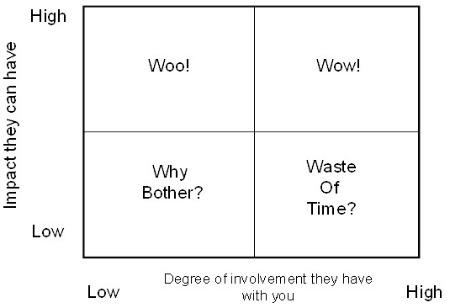Flatter organisational structures can open up opportunities if you have the right mix of skills.
Whatever happened to hierarchy? It used to be the thing everyone aspired to, clambering your way to the top of the pile with all the power and perks that went with it. There is no doubt people still want to achieve great things, however the more traditional structures of organisational leadership appear to have almost disappeared, and we are in tricky mazes of matrix management.
Flat organisation charts, project-based teams coming together and divisional structures all require a new set of skills to succeed. Interestingly this opens up opportunities for a wider group, you may no longer need to have all the skills of Neo to overcome the matrix, just some of the following.
 "Don’t get caught up in petty battles over status when there is a longer term prize to be won."
"Don’t get caught up in petty battles over status when there is a longer term prize to be won." Focus on your social skills
Firstly you need to concentrate as much on your social skills as anything else. Psychologists measure skills in quotients, your intelligence is your IQ, your emotional knowledge is your EQ and your social skills are your SQ.
Traditionally IQ got you to the top. Get an Oxbridge degree and even if you were a bumptious bore you could make it. Now you won’t even get past the first interview. Emotional intelligence was the all the rage a few years ago and still has its value. The challenge is that EQ can sometimes spend too much time on introspection and not enough time on action. SQ is the key skill in matrix organisations – your social skills and ability to get disparate groups to work together and your adeptness at getting people to do the things you want them to, even if you have no line management over them.
Understand your motivation
Second, you need to have a simple method to understand your own motivation and the motivation of others. There are many tests out on the market – Myers Briggs, Insights, DISC, Tetramap to name but a few. If you can give yourself a model of your own behaviour, then you can start to see how it might fit in with others.
The key skill here is to recognise that if you can shape your requests and interactions with others in the way that suits their style, they are both far more likely to do what you want, and will even think you are a great person to work with at the same time.
Identify your stakeholders
Third, get really focussed on who you need to network with. Use this classic four box matrix (below) to plot out your key stakeholders. You have to name names – it is not good enough just to plot out marketing department or the Berlin office. Stakeholder management is only effective if it is up close and personal.
Once you have the names you need, then select just a few you want to work on from the woo box and a few from the wow box. Make individual plans – how often can you interact with them in the next few months? What will you say? What impression do you want them to have? Remember it does not have to be a big interaction – indeed many people don’t interact with senior folk because they are concerned they don’t have something super-important to tell them.
It is better to have several small interactions – a one-minute update on the market position, for example – rather than risking your reputation on one big presentation. Little and often is the way to build up a more solid reputation.

Think more chess than chequers
Finally, you need to think more chess than chequers. As you will know from the film – things can get a bit complicated in the Matrix. The way that companies move and morph is often unpredictable. There were no doubt people in the News of the World hierarchy who thought for sure that 2011 could be their year for a big promotion.
If you think of your career only as chequers then you are always just trying to move forward, only being able to make those tricky backward moves when you have already become king. Chess is more like the game of modern business: people have different skills, you can build strength over time and often by sideways or backwards moves. Don’t get caught up in petty battles over status when there is a longer term prize to be won.
Of course hierarchy is not totally dead: you will always have bosses and organisational charts and reserved car parking spaces to yearn for. The good news is that these simple skills of social interaction, motivational understanding, networking and long term thinking are all skills – they can be learned.
Christopher Barrat is a motivational speaker and communications expert. He can be contacted at www.greystone.co.uk.
Flatter organisational structures can open up opportunities if you have the right mix of skills.
Whatever happened to hierarchy? It used to be the thing everyone aspired to, clambering your way to the top of the pile with all the power and perks that went with it. There is no doubt people still want to achieve great things, however the more traditional structures of organisational leadership appear to have almost disappeared, and we are in tricky mazes of matrix management.
Flat organisation charts, project-based teams coming together and divisional structures all require a new set of skills to succeed. Interestingly this opens up opportunities for a wider group, you may no longer need to have all the skills of Neo to overcome the matrix, just some of the following.
 "Don’t get caught up in petty battles over status when there is a longer term prize to be won."
"Don’t get caught up in petty battles over status when there is a longer term prize to be won." Focus on your social skills
Firstly you need to concentrate as much on your social skills as anything else. Psychologists measure skills in quotients, your intelligence is your IQ, your emotional knowledge is your EQ and your social skills are your SQ.
Traditionally IQ got you to the top. Get an Oxbridge degree and even if you were a bumptious bore you could make it. Now you won’t even get past the first interview. Emotional intelligence was the all the rage a few years ago and still has its value. The challenge is that EQ can sometimes spend too much time on introspection and not enough time on action. SQ is the key skill in matrix organisations – your social skills and ability to get disparate groups to work together and your adeptness at getting people to do the things you want them to, even if you have no line management over them.
Understand your motivation
Second, you need to have a simple method to understand your own motivation and the motivation of others. There are many tests out on the market – Myers Briggs, Insights, DISC, Tetramap to name but a few. If you can give yourself a model of your own behaviour, then you can start to see how it might fit in with others.
The key skill here is to recognise that if you can shape your requests and interactions with others in the way that suits their style, they are both far more likely to do what you want, and will even think you are a great person to work with at the same time.
Identify your stakeholders
Third, get really focussed on who you need to network with. Use this classic four box matrix (below) to plot out your key stakeholders. You have to name names – it is not good enough just to plot out marketing department or the Berlin office. Stakeholder management is only effective if it is up close and personal.
Once you have the names you need, then select just a few you want to work on from the woo box and a few from the wow box. Make individual plans – how often can you interact with them in the next few months? What will you say? What impression do you want them to have? Remember it does not have to be a big interaction – indeed many people don’t interact with senior folk because they are concerned they don’t have something super-important to tell them.
It is better to have several small interactions – a one-minute update on the market position, for example - rather than risking your reputation on one big presentation. Little and often is the way to build up a more solid reputation.

Think more chess than chequers
Finally, you need to think more chess than chequers. As you will know from the film – things can get a bit complicated in the Matrix. The way that companies move and morph is often unpredictable. There were no doubt people in the News of the World hierarchy who thought for sure that 2011 could be their year for a big promotion.
If you think of your career only as chequers then you are always just trying to move forward, only being able to make those tricky backward moves when you have already become king. Chess is more like the game of modern business: people have different skills, you can build strength over time and often by sideways or backwards moves. Don’t get caught up in petty battles over status when there is a longer term prize to be won.
Of course hierarchy is not totally dead: you will always have bosses and organisational charts and reserved car parking spaces to yearn for. The good news is that these simple skills of social interaction, motivational understanding, networking and long term thinking are all skills – they can be learned.
Christopher Barrat is a motivational speaker and communications expert. He can be contacted at www.greystone.co.uk.







